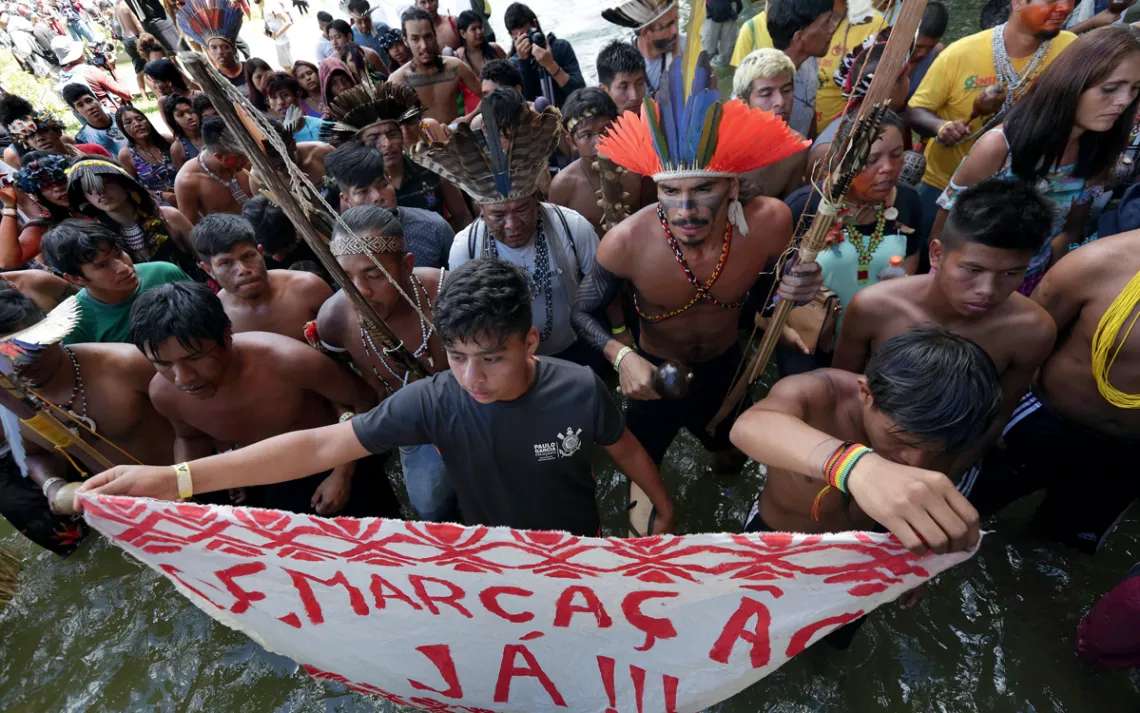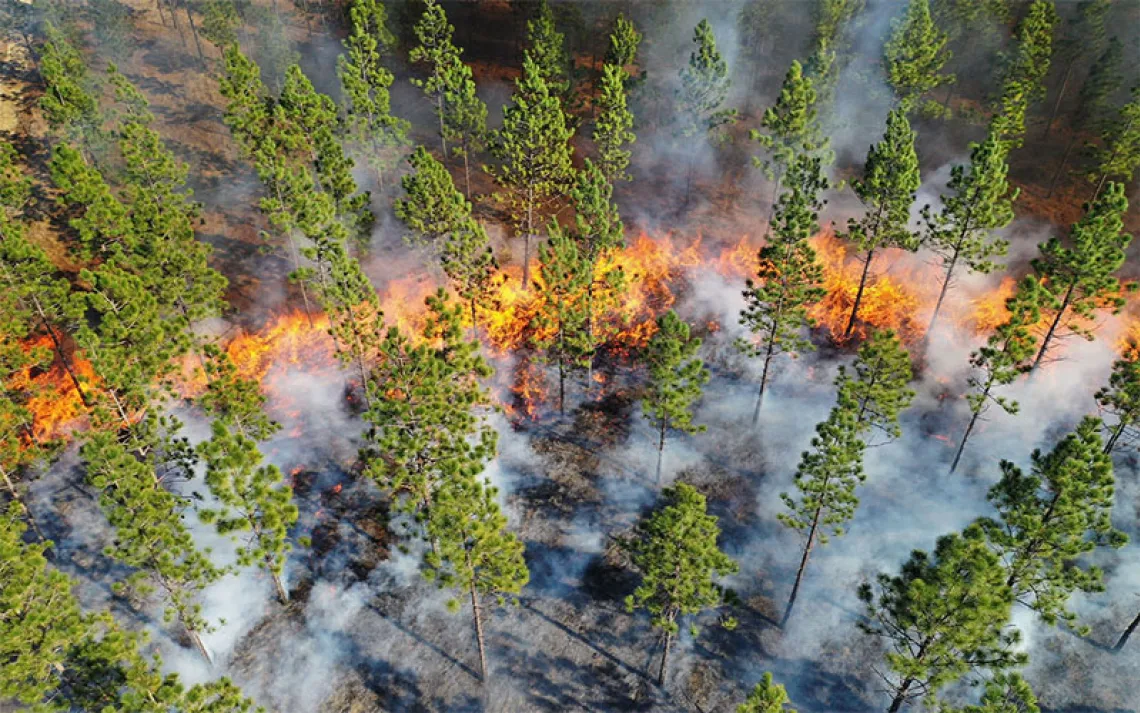Brazil's New President Is Bulldozing the Amazon Rainforest and Indigenous Rights
Deforestation, fires in the Amazon skyrocketing under Jair Bolsonaro

Brazil's Indigenous communities have pushed back against President Jair Bolsonaro's attempts to open the Amazon to increased ranching. | Photo by Eraldo Peres/AP Photo
At first glance, satellite imagery of the Karipuna territory in Brazil shows an oasis of thick, green Amazon jungle surrounded by farms and ranches. But zoom in and scratches appear amid the greenery, gashes that stretch deep into this reserve in the northwestern state of Rondonia: These are illegal roads running through the heart of Indigenous Karipuna lands, allowing entry for loggers and land grabbers.
In 1998, the Brazilian government granted the Karipuna people sovereignty over some 378,000 acres of Amazon rainforest as part of a sweeping national program to redress colonial wrongs and recognize Indigenous peoples' rights to the lands they traditionally occupied. But between 2015 and 2018, some 20,000 acres of Karipuna forest were degraded or destroyed. Grileiros, or land grabbers, have been parceling out Karipuna land to sell to speculators and cattle farmers. Illegal loggers—linked to "dangerous criminal organizations," according to Rondonia's public prosecutor—haul off precious ipe hardwood, then come back for more. The 26-year-old chief of the Karipuna tribe, Andre Karipuna, says that he can often hear the loggers' trucks and tractors running well into the night.
The attacks on Karipuna land are just one example of new threats to the Amazon's well-being.
Fifteen years ago, Luiz Inácio Lula da Silva, Brazil's then president, enacted a series of landmark measures to stop deforestation of the Amazon, sometimes referred to as "the lungs of the planet." The reforms were an overwhelming success. Brazil hit its 2020 goal of reducing greenhouse gas emissions from deforestation ahead of schedule.
Now, a rightist government is rolling back the laws and regulations meant to protect the Amazon and the Indigenous peoples who live there. And deforestation in the Amazon has spiked to a 10-year high; more than 1,300 square miles of forest were cut down between January and July, a 39 percent increase compared with the same period in 2018.
It's poised to get worse. The country's new president, Jair Bolsonaro, is a former army captain who eulogizes Brazil's brutal military dictatorship of the 1960s and 1970s. He has vowed to open up Amazonia for increased cattle ranching, agriculture, and mining—and to stop establishing new Indigenous territories. "Not one centimeter of land will be demarcated for Indigenous reserves," Bolsonaro declared during the 2018 presidential campaign.
On January 1, his first day in office, Bolsonaro made good on that promise. He transferred the titling of Indigenous territory to the Ministry of Agriculture, which is under the direction of Minister Tereza Cristina Corrêa da Costa Dias, an outspoken proponent of opening Indigenous lands to commercial farming. Two months later, Minister of Mines and Energy Bento Albuquerque told mining representatives at a conference in Toronto that Brazil is considering opening up new lands to private mining companies. Albuquerque assured executives that Indigenous communities would not have the veto power to block new mining concessions.
President Bolsonaro's attempts to free up Native lands for private and corporate interests are often cloaked in rhetoric about the supposed righteousness of "integrating" Brazil's Indigenous peoples into modern society. "Why in Brazil do we have to keep them prisoners in reserves as if they were animals in zoos?" Bolsonaro asked shortly after his election. "Less than a million people live in these isolated areas, exploited and manipulated by NGOs. We are going to integrate these citizens," the president tweeted after his inauguration.
But the idea of assimilating Brazil's Indigenous peoples runs contrary to the rights enshrined in the Brazilian Constitution of 1988, which calls for respecting Indigenous culture and territory. It is also a dangerous throwback to the mindset of the former military dictatorship, which killed more than 8,300 Indigenous people while pushing development in the Amazon region.

Sign up to receive Sierra News & Views
Get articles like this one sent directly to your inbox weekly.
With this action you affirm you want to receive Sierra Club communications and may vote on policy designated by the Sierra Club Board.
Even before Bolsonaro came to power, violence against Indigenous communities was not uncommon. Between 2003 and 2015, 742 Indigenous people were killed, according to data compiled by the Pastoral Land Commission; most of the deaths involved conflicts over land. Now, Bolsonaro's anti-Indigenous rhetoric has been instrumental in spurring illegal land grabbers into action. Invasions of Native territories like the Karipuna's have increased by 150 percent since Bolsonaro's election, according to the Indigenous Missionary Council, an advocacy group.
Andre Karipuna says that the individuals behind the invasions of his people's territory have threatened to burn down his village and kill him and his brother, also a tribal leader. "They were strengthened by Bolsonaro. They believe they are backed by the president," he says. "I'm afraid there may be a massacre. I'm afraid for my life, for my people."
Indigenous peoples have pushed back against the Bolsonaro administration's agenda. In late April, thousands of tribal members from across the country marched on the capital, Brasília. They camped for several days and called for land rights to be respected. A month later, Congress overturned Bolsonaro's early measure on Indigenous land titling, shifting power back to the Ministry of Justice.
Some in Brazil's Indigenous movement called it a "historic victory." But the Bolsonaro government's attack on Indigenous rights and the environment continues. Between January and May, Brazil's Ministry of the Environment issued fewer fines for illegal deforestation than it had during that period in the past 11 years. The status of 334 national parks, forest reserves, and wildlife refuges around the country is under review.
"We have been suffering day after day, as our rights are cut," says Kerexu Yxapyry, a leader of the Kerexu tribe in Santa Catarina, who describes this moment as the second invasion of Indigenous land, 500 years after European arrival. "We know our struggle will be arduous. Maybe many of our leaders will be killed, but we are organized. And we are going to defend our rights."
This article appeared in the September/October 2019 edition with the headline "Rumble in the Jungle."
 The Magazine of The Sierra Club
The Magazine of The Sierra Club



